Arnold of Brescia facts for kids
Quick facts for kids
Arnold of Brescia
|
|
|---|---|

Monument to Arnold of Brescia in Brescia, Italy (1882).
|
|
| Born | c. 1090 |
| Died | June 1155 (aged 64–65) |
| Cause of death | Execution by hanging |
| Nationality | Italian |
| Occupation | Canon regular |
| Movement | Proto-Protestantism |
Arnold of Brescia (born around 1090 – died June 1155) was an Italian religious leader. He was also known as Arnaldus (Italian: Arnaldo da Brescia). Arnold was a canon regular, which is a type of priest who lives in a community. He came from Lombardy, a region in Italy.
Arnold believed the Church should not own property. He thought priests should live simply, like the first apostles. He also took part in a movement to create a republic in Rome. This movement, called the Commune of Rome, tried to take power from the Pope.
Arnold was forced to leave his home several times. He was eventually arrested and hanged. His body was burned, and his ashes were thrown into the Tiber River. Even though he faced a sad end, his ideas about the Church being poor became popular. Many groups, like the Waldensians, were inspired by his teachings. Some people even see him as an early leader of the Reformation.
Contents
Arnold's Life Story
Early Life and Criticisms
Arnold was born in Brescia, a city in Italy. He became an Augustinian canon, a type of priest living under the rules of Saint Augustine. Later, he became the leader, or prior, of a monastery in Brescia.
Arnold started to criticize the Catholic Church. He believed the Church had too much power and wealth. In Brescia, the Church was fighting over land with the city government. Arnold said the Church should give up its land. He thought the Church should not be involved in worldly things. This idea, called "renunciation of worldliness," was very important to him.
Exile and Teachings
Because of his strong views, Arnold was condemned in 1139. This happened at a big meeting called the Second Lateran Council. He was then forced to leave Italy.
A writer named Otto of Freising said Arnold studied in Paris. He learned from a famous teacher named Pierre Abélard. Arnold agreed with Abélard's ideas for making monasteries better. However, their ideas were rejected by another important leader, Bernard of Clairvaux, in 1141.
Arnold continued to speak out against the Church's decisions. He returned to Paris and kept teaching his ideas. Because of this, Pope Innocent II told him to stop speaking and sent him away again. Arnold found safety first in Zürich and then possibly in Bavaria. The Pope even ordered his writings to be burned. This is the only way we know he might have written anything down. Arnold kept sharing his ideas about the Church being poor.
Return to Rome and the Republic
After 1143, Arnold returned to Italy. In 1145, he made peace with Pope Eugene III. The Pope told him to come to Rome. When Arnold arrived, he found the city in a new state. People led by Giordano Pierleoni had taken control from the Pope. They had started a republic called the Commune of Rome.
Arnold quickly joined the people's side. He became an important leader of the Commune. He spoke about freedom and democratic rights for the people. Arnold taught that priests who owned property could not perform religious ceremonies. He even helped force Pope Eugene out of Rome in 1146. Because of this, Arnold was excommunicated, meaning he was kicked out of the Church.
Even after Pope Eugene returned to Rome in 1148, Arnold continued to lead the new republic. A historian named Caesar Baronius called Arnold "the father of political heresies." Another writer, Edward Gibbon, said Arnold was the first to call for "Roman liberty."
Final Years and Legacy
After Pope Eugene died, Pope Adrian IV worked to get control of Rome back. He teamed up with Frederick Barbarossa, a powerful emperor. In 1155, Frederick's army took Rome by force. This forced Arnold to leave the city again.
Arnold was captured by the emperor's soldiers. He was put on trial by the Church leaders in Rome. He was accused of being a rebel, but not of being a heretic (someone who goes against Church teachings). Arnold refused to change his mind about his beliefs. He was found guilty of rebellion and hanged in June 1155.
After his death, Arnold's body was burned. His ashes were thrown into the Tiber River. This was done to stop people from making his burial place a special shrine. The Church did not want him to be seen as a martyr, a person who dies for their beliefs.
In 1882, long after the Pope lost his power over Rome, the city of Brescia built a monument to Arnold. This monument honored him as a hero from their city.
Arnold's Beliefs
Arnold strongly criticized the power of the Roman Church. He wanted to see priests live more moral lives. Arnold believed that the Church and the government should be completely separate. He did not think the Church should control the state.
A key idea for Arnold was "apostolic poverty." He thought the Church should go back to how it was in the early days. He believed priests should live simply, without much money or property. Arnold also thought that if priests were sinful, they lost their right to perform religious ceremonies. Some people also disagreed with his ideas about religious practices like baptism.
See also
 In Spanish: Arnaldo de Brescia para niños
In Spanish: Arnaldo de Brescia para niños
- History of Rome in the Middle Ages
- Waldensians
- Donatists
 | Anna J. Cooper |
 | Mary McLeod Bethune |
 | Lillie Mae Bradford |

